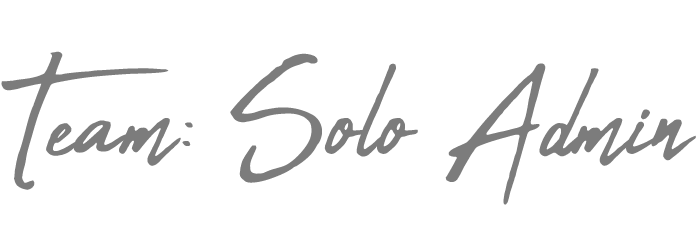No one at your organization should understand your position and responsibilities better than you. It is important to clarify your admin responsibilities to ensure mutual understanding between those you work with, the organization, and yourself. Your admin responsibilities are your primary obligation to the company, and your direct manager, colleagues, and yourself should all be perfectly clear as to what they are.
Why? Well, BECAUSE IT’S LOGICAL, PRACTICAL, and minimizes the impact of the “grey area.”
This week we’re going to discuss your admin job responsibilities. I want to take the time to discuss what your job responsibilities are, and, equally important, what they are not.
What Are Your Admin Responsibilities?
As I’ve said before in MANY other posts, there’s no one way to be a perfect admin. However, there are definite guidelines to help you understand how to become the best admin for your organization.
One of the best starting points for understanding how to be a great admin is to incorporate the “big picture” into your considerations. More specifically, you want to think about how to “fit” within the “big picture.” Placing yourself and your role inside of the “big picture” will help you integrate yourself into the organization more naturally. As you move through the process, this natural integration will help you to more clearly identify how you want to set up your administrative system.
So let’s jump into what our administrative responsibilities typically include.
Admin Responsibilities Includes Support
There are different types of “support.” Don’t let the word fool you. Most of our non-admin colleagues might assume that “support” means to help them, but that’s not exactly what I mean.
I use “support” in the sense that we proactively support the plan and goals set by the department/organization. That is a completely different level of support than what your colleagues might assume.
This level of support helps to elevate your decision-making rationale, and carry forward the “tone” that your organization is attempting to establish within the company. Admins can have a pretty big impact on the workplace environment, and can get a read on how colleagues really feel about being at the organization.
Carrying this sentiment with you in all of your actions will help you put the right foot forward at all times. If done consistently, your dedication to the support for department goals might precede you.
Ensuring Reliable Efficiency
Moving past the more nebulous aspects of our job, we quickly run into the practical application of our roles – MAKING THAT SUCKER RUN!!

This part is my favorite part.
One of an admin’s primary administrative responsibilities is to ensure the office runs like a well-oiled machine. It is no one else’s job to check to ensure the office is running smoothly. This is the best time to figure out a way to increase efficiency, try new products/software, and get familiar with the administrative system.
Whatever notes you took about improvements during your onboarding process/training, it’s time now to bring them out!
Consistency
Everything in an organization is likely to change over time, so it is important that admins can offer colleagues and clients the same level of support and service at all times.
Figuring out how to offer a high level of service and reliability is crucial to our success. Consistent results provide clients, managers, and colleagues a benchmark upon which to rely, which builds trust.
Being able to build trust in people, organizations, and yourself is an enormous benefit regardless of the industry.
What Admin Responsibilities Are Not
- The ability to give authority/permission
- Back up for other people’s responsibilities
- A scapegoat/yes person
- Responsible for others’ personal matters
Authority/Permission
Organizations employ administrative professionals to offer support to the company and to other professionals. We are not the major decision makers on matters, nor should we have to agree with decisions made.
Admins offer guidance based on their area of expertise, and are accountable only for the decision within the administrative purview. When someone asks you a question or for your opinion, clarify what you see as an admin nothing else.

We are not conduits to bypass management or get private information. We don’t tell you what you have to do or if you can do it. Our responsibility is to inform you how it has to be done.
Other People’s Job
People, sometimes, unknowingly mistreat their highly effective/productive employees with a disproportionate amount of work. This can occur when managers believe an employee produces higher-quality work better and faster than others.
Because the manager knows this employee can deliver the results, they will give them more, harder, or more complex projects than their colleagues. This can cause resentment (I mean, how could they NOT know this), and the urge to produce lower-quality work in order to be treated fairly.
I personally couldn’t give inferior quality work. It was a matter of pride, but I did experience resentment when I experienced this kind of treatment.
Scapegoat/”Yes” Person
Third, it is not the responsibility of an admin to take responsibility for actions not within their control. As mentioned before, admins do not give permission or authority to anyone without getting the permission from their manager.
If a manager or organization makes a bad call, it is not the responsibility of the admin to take accountability for their manager’s decisions.
Furthermore, admins should not feel pressured to agree with managers or bosses if they do not agree. Admins are allowed their own opinions.
Everyone may disagree with other people. It’ll be okay.
Personal Matters
Point #1: Admins are not obligated to do personal favors, listen to personal stories, or concern themselves with any other personal details unless they choose to.
Point #2: Administrative professionals are only obligated to support in a professional capacity. I found in one experience, employees (including some admins as well) viewed admins as caretakers and spoke to them as such.
Point #3: I find it demeaning that my high standards, attention to detail, and time management are likened to that of a nagging wife or mother. It is LITERALLY my job to make sure everything gets done well and on time. I’m not your mother or office wife.
I hope you enjoyed learning about the admin responsibilities. If you liked this content, please consider joining my email list.
Photo by Alexis Baydoun on Unsplash


